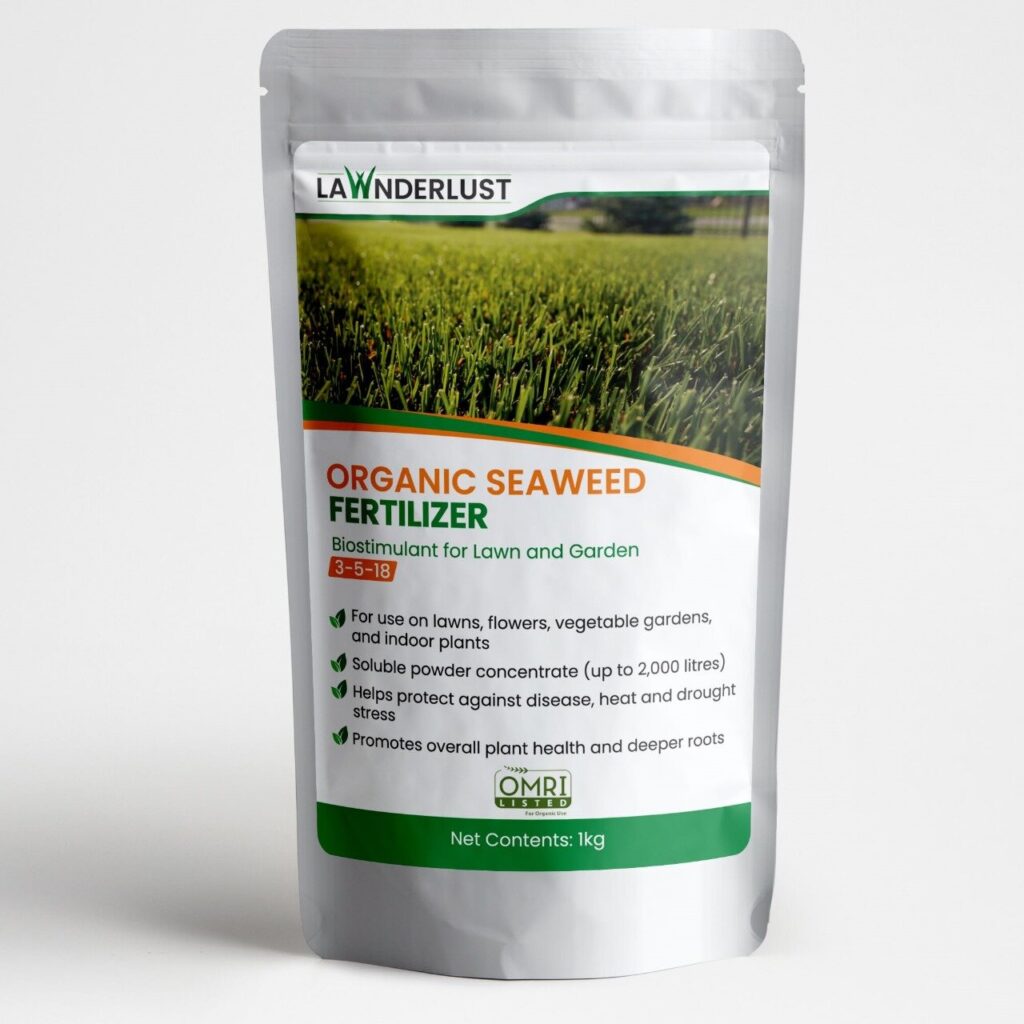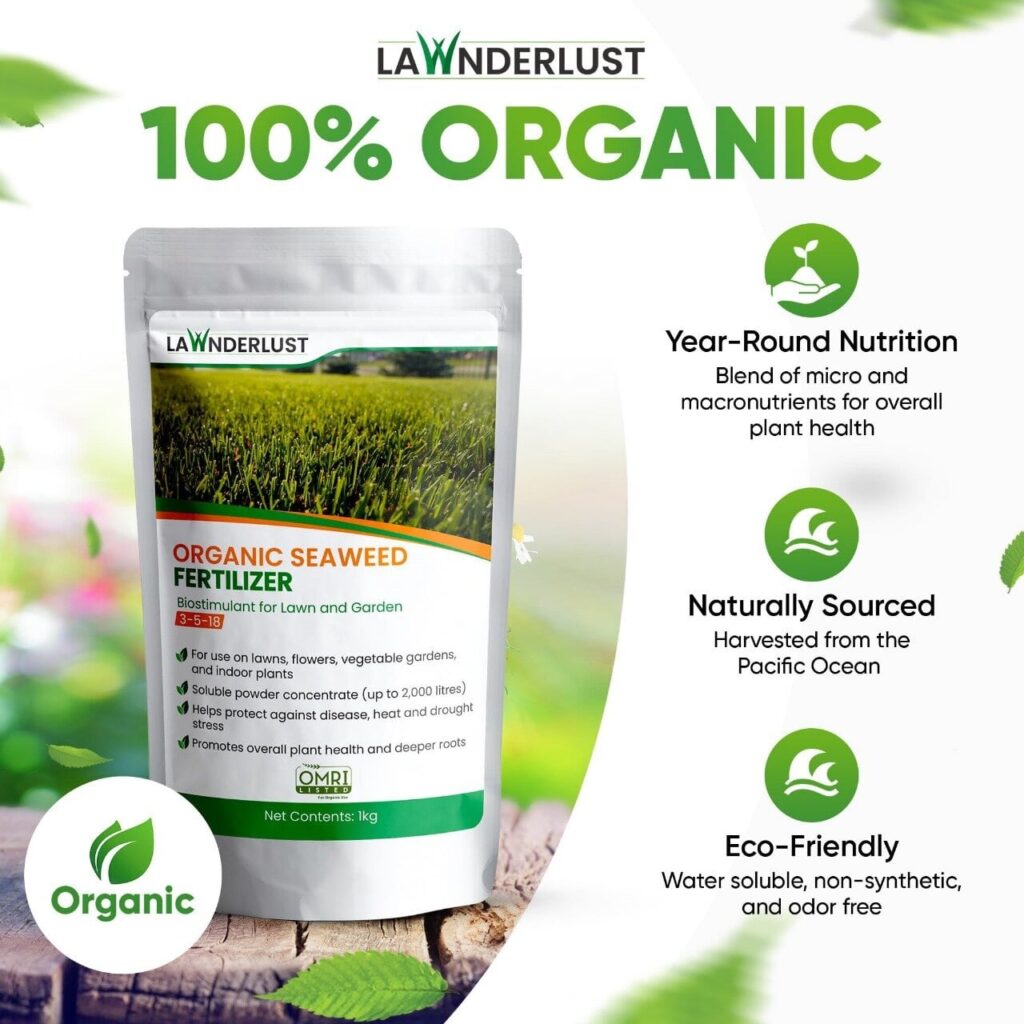If you’re looking to enhance your garden or lawn in a natural and eco-friendly way, look no further than organic seaweed fertilizer. Known for its numerous benefits, seaweed-based fertilizers are becoming the go-to choice for environmentally conscious gardeners and lawn enthusiasts alike. Recommended by Lawnderlust, an expert in sustainable lawn care, seaweed fertilizer provides a perfect balance of nutrients and natural growth boosters for your plants and soil.

Page Contents
What Makes Organic Seaweed Fertilizer So Special?
Organic seaweed fertilizer is derived from marine algae, rich in essential minerals and nutrients. Unlike synthetic fertilizers, seaweed fertilizers provide a complete range of macronutrients (NPK), micronutrients, amino acids, vitamins, and growth hormones. These natural compounds not only nourish plants but also improve soil health, making it more resilient and sustainable in the long run.
Seaweed fertilizers contain natural plant growth regulators, including cytokinins, auxins, and gibberellins, which help boost root growth, promote flower and fruit production, and increase overall plant vigor. These hormones also help plants better resist environmental stress, such as drought and heat.
The Top Benefits of Organic Seaweed Fertilizer
1. Boosts Plant Growth Naturally
Seaweed fertilizers contain natural growth hormones that support root development, stem elongation, and improved flower production. The presence of auxins helps promote strong, deep roots, while cytokinins and gibberellins enhance overall plant growth. Whether you’re growing flowers, vegetables, or herbs, seaweed fertilizer helps your plants thrive from root to bloom.
2. Improves Soil Health
One of the most significant benefits of seaweed fertilizer is its ability to improve soil structure. The nutrients in seaweed fertilizers help soil retain moisture, improve aeration, and encourage beneficial microbial activity. As a result, the soil becomes more fertile and better able to support healthy plant growth. Seaweed also increases the soil’s ability to hold nutrients, reducing the need for additional fertilizers.
3. Natural Pest and Disease Resistance
Seaweed fertilizers help plants build natural resistance to pests and diseases. By enhancing the plant’s immune system, seaweed reduces the likelihood of infection and pest damage. Seaweed’s natural compounds also act as a deterrent for harmful insects, making your garden less susceptible to common garden pests.
4. Enhanced Drought Resistance
One of the standout qualities of seaweed fertilizers is their ability to improve a plant’s resistance to drought and heat. Seaweed’s natural sugars and amino acids help plants manage water more efficiently. This makes your garden more resilient, even during dry spells, helping you conserve water while keeping your plants healthy.

How to Use Organic Seaweed Fertilizer for Maximum Benefits
1. Garden Application
For best results, organic seaweed fertilizer can be used in liquid or granular forms:
- Liquid Form: Dilute the fertilizer as per the instructions on the package. You can apply the liquid directly to the soil or use it as a foliar spray to nourish your plants. Morning application is best to avoid the heat of the day and allow for better absorption.
- Granular Form: Simply spread the granules evenly across your soil and lightly work them into the top layer. Be sure to water thoroughly after applying to ensure the nutrients are absorbed by the plant roots.
2. Lawn Application
Organic seaweed fertilizer is equally beneficial for lawns. It encourages deeper root growth, making your grass stronger and more resilient.
- Spray Application: Use a sprayer to evenly distribute the liquid fertilizer across your lawn. Ensure you cover the entire area and water lightly afterward.
- Granular Application: If you’re using granular fertilizer, a spreader will help you distribute it evenly across your lawn. Water immediately after application to allow the nutrients to soak in.
Seasonal Benefits of Organic Seaweed Fertilizer
Spring: Applying seaweed fertilizer in the spring helps kickstart plant growth after the dormant winter months. It supports early root development and prepares plants for the growing season, ensuring they are ready to thrive.
Summer: In summer, seaweed fertilizer helps your plants combat the stresses of heat and drought. It promotes healthy growth, increases flower production, and supports fruiting for a bountiful harvest.
Fall: Use seaweed fertilizer in the fall to prepare your garden and lawn for the winter. It strengthens roots and enhances plants’ ability to store nutrients for the colder months, ensuring they are ready for a healthy start in the spring.
Why Organic Seaweed Fertilizer is Eco-Friendly
Using organic seaweed fertilizer is not just good for your plants, but also for the environment. Unlike chemical fertilizers, seaweed fertilizers don’t contribute to chemical runoff, which can harm nearby water sources and aquatic life. Seaweed is a renewable resource, making this type of fertilizer a sustainable option for gardeners who want to reduce their environmental impact. By improving soil health, seaweed fertilizer also promotes healthier ecosystems, supporting beneficial soil microbes and enhancing soil biodiversity.
Long-Term Cost-Effectiveness
While organic fertilizers might have a higher upfront cost, the long-term benefits far outweigh the investment. Seaweed fertilizer improves soil structure and fertility, which reduces the need for additional fertilizers and pesticides. It also helps conserve water, cutting down on the need for frequent irrigation, and promotes healthier plants that require less maintenance. By using seaweed fertilizer, you’ll spend less over time while enjoying a greener, healthier garden or lawn.
Conclusion: The Natural Choice for a Thriving Garden and Lawn
Switching to organic seaweed fertilizer is a smart decision for any gardener or homeowner looking to promote sustainable, natural plant care. Seaweed fertilizers offer a wide range of benefits—from improved soil health and plant growth to enhanced pest resistance and drought tolerance. With regular use, you’ll enjoy healthier plants, a more vibrant garden, and a greener lawn.
Visit Lawnderlust for expert tips and advice on how to incorporate organic seaweed fertilizer into your lawn care and gardening routine. Make the switch today, and watch your outdoor space thrive naturally while benefiting the environment.
Frequently Asked Questions (FAQs) about Organic Seaweed Fertilizer
1. What is organic seaweed fertilizer?
Organic seaweed fertilizer is a natural product derived from marine algae. It is rich in essential nutrients like nitrogen (N), phosphorus (P), potassium (K), trace minerals, amino acids, and natural growth hormones. Unlike synthetic fertilizers, it nourishes plants and improves soil health while being environmentally friendly.
2. How does seaweed fertilizer benefit plants?
Seaweed fertilizer promotes healthy plant growth by providing essential nutrients and natural growth hormones. It enhances root development, improves flower and fruit production, boosts plant immune systems, and increases resistance to drought and pests. It also improves soil structure, moisture retention, and microbial activity, leading to healthier plants in the long run.
3. How do I apply organic seaweed fertilizer?
You can apply organic seaweed fertilizer in either liquid or granular form:
- Liquid Application: Dilute according to the product instructions and apply directly to the soil or as a foliar spray. Apply in the early morning for best absorption.
- Granular Application: Spread the granules evenly across the soil and lightly work them into the topsoil. Water thoroughly after application to ensure nutrient absorption.
4. How often should I apply seaweed fertilizer?
For best results, apply seaweed fertilizer every 4 to 6 weeks during the growing season. You can also make seasonal adjustments:
- Spring: To support early growth and root development.
- Summer: To maintain growth and combat heat stress.
- Fall: To prepare plants for winter and enhance root strength.
5.Is seaweed fertilizer safe for the environment?
Yes, organic seaweed fertilizer is eco-friendly. It is made from renewable marine resources and is biodegradable, making it a sustainable option for gardeners.
6.Does seaweed fertilizer help with pest control?
Yes, seaweed fertilizer enhances plant resistance to pests and diseases. The natural compounds in seaweed help strengthen plant cell walls and boost their immune systems, making them less susceptible to pests and diseases.




